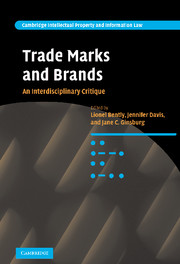Book contents
- Frontmatter
- Contents
- List of figures and tables
- Notes on the contributors
- Editors' preface
- Table of cases
- Table of statutes
- Part I Legal and economic history
- Part II Current positive law in the EU and the USA
- Part III Linguistics
- Part IV Marketing
- Part V Sociology
- Part VI Law and Economics
- Part VII Philosophy
- Part VIII Anthropology
- 15 An anthropological approach to transactions involving names and marks, drawing on Melanesia
- 16 Traversing the cultures of trade marks: observations on the anthropological approach of James Leach
- Part IX Geography
- Bibliography
- Index
- Titles in the series
16 - Traversing the cultures of trade marks: observations on the anthropological approach of James Leach
Published online by Cambridge University Press: 13 April 2010
- Frontmatter
- Contents
- List of figures and tables
- Notes on the contributors
- Editors' preface
- Table of cases
- Table of statutes
- Part I Legal and economic history
- Part II Current positive law in the EU and the USA
- Part III Linguistics
- Part IV Marketing
- Part V Sociology
- Part VI Law and Economics
- Part VII Philosophy
- Part VIII Anthropology
- 15 An anthropological approach to transactions involving names and marks, drawing on Melanesia
- 16 Traversing the cultures of trade marks: observations on the anthropological approach of James Leach
- Part IX Geography
- Bibliography
- Index
- Titles in the series
Summary
Anthropology, we are told, involves the study of societies, so an anthropological perspective on trade marks, by definition, entails a search for social meaning. James Leach notes that a ‘trade mark’ is, in legal terms, a sign used to denote the source of a trader's goods or services in the market. The legislators’ conception of a trade mark, reinforced by countless judicial statements and scholarly pronouncements, however, only gives a partial account of trade marks. In particular, it suggests that the central function of trade marks is to mediate between supply and demand in a mass market economy. This leads to a delimited role for trade marks, under which (as Dr. Leach says) ‘the primary value of the sign is not in itself, but in reference to a real thing in the world, a service (labour) of others, or an item that is used/consumed by its receiver’. Or, in the words of Duncan Kerly from the first edition of his Law of Trade Marks, published in 1894, a trade mark is ‘a symbol … applied or attached to goods … offered for sale in the market …, so as to distinguish them from similar goods, and to identify them with a particular trader …’, the implication being that they have no other important function. Nevertheless, it may be questioned whether this conception fully accounts for the operation of trade marks in practice or even under law.
- Type
- Chapter
- Information
- Trade Marks and BrandsAn Interdisciplinary Critique, pp. 343 - 358Publisher: Cambridge University PressPrint publication year: 2008
- 1
- Cited by



